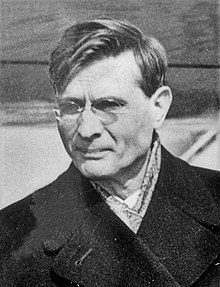Mikhail Andreevich Suslov
Mikhail Suslov ( Russian Михаил Андреевич Суслов ., Scientific transliteration Mikhail Suslov Andreevič ; born November 8 . Jul / 21st November 1902 greg. In Schachowskoje, Ulyanovsk Oblast ; † 25. January 1982 in Moscow ) was a Soviet politician.
Life
Education and advancement
Suslow studied economics and later taught himself at Lomonosov University and the Plekhanov Academy of Economics in Moscow. Since 1921 he was a member of the Communist Party of the Soviet Union . From 1931 to 1934 he was a member of the party's control commission. 1937–1939 he was "Obkomsekretär" of Rostov , 1939–1944 First Krajkomsekretär of Stavropol , 1939–1941 member of the Revision Commission and 1944–1946 Chairman of the Office of the Central Committee for Lithuania , in this function he was involved in the Great Terror and the deportations of Chechens from the Caucasus and Lithuanians involved. In 1941 he became a member of the party's central committee .
At the center of power
Suslov was secretary of the party's central committee from 1947 until his death in 1982 . For a short time from 1949 to 1950 he was also editor-in-chief of Pravda . From 1952 to 1953 and then again from 1955 to 1982 he was elected to the Politburo (1952-1966 Presidium) of the CPSU , the most powerful political leadership body in the Soviet Union, and from around 1959 he was considered one of the most powerful party leaders in the USSR .
Suslov was promoted by Khrushchev after the Stalin era . He supported before and after the XXI. and XXII. Party congresses of the CPSU together with Koslow , Polyansky , Podgorny , Kuusinen , Ignatow and Schwernik Khrushchev against the Stalinists around Malenkov and Molotov as part of the de-Stalinization measures .
In 1960 he led the Soviet delegation in China with Kozlov, with the aim of ideological rapprochement. Significant contributions in the party committees distinguished him as the “chief ideologist” of the party, as a representative of a collective leadership and as a cautious opponent of the personality cult.
The Cuban Missile Crisis of 1962, the break with China, the new policy towards Germany, the policy against heavy industry, the increasingly authoritarian leadership style of Khrushchev with simultaneously decreasing power, the rise of Brezhnev within the party as well as the increasing dogmatism of his own prompted Suslov to reorient himself.
In October 1964 he actively supported Brezhnev in the overthrow of Khrushchev. The leadership of party and state was now determined by the Brezhnev Quartet as General Secretary, Kosygin as Prime Minister, Podgorny as Head of State and Suslov as the dogmatic "party ideologist" and Central Committee Secretary for Organization.
Suslow's health was not stable: as a young man he suffered from tuberculosis , while working as a Communist Party functionary in Lithuania he experienced similar seizures after particularly sharp verbal battles related to epilepsy . He later became a diabetic ; after his heart attack in 1976, Suslov could no longer work hard.
Until his death in 1982, Suslov remained as number two in the party, the " gray eminence " in the significant background of power: reserved, dogmatic, loyal and conservative, he shaped this period of political stagnation in the CPSU and in the Soviet Union.
Honors
Suslov was buried at the Kremlin wall .
literature
- Michel Tatu: Power and Powerlessness in the Kremlin. Ullstein, Berlin / Frankfurt / Vienna 1968.
- Merle Fainsod : How Russia is governed. Kiepenheuer, Berlin / Cologne 1965.
- Mikhail Gorbachev : Memories. Siedler, Berlin 1996; ISBN 3-88680-524-7 .
Web links
- Literature by and about Michail Andrejewitsch Suslow in the catalog of the German National Library
- Newspaper article about Michail Andrejewitsch Suslow in the press kit of the 20th century of the ZBW - Leibniz Information Center for Economics .
- In the bibliographic internet database RussGUS (freely accessible) around 30 references are offered for "Suslow" (search for subject notations under form search: 16.2.2 / Suslov *).
- Article Michail Andrejewitsch Suslow in the Great Soviet Encyclopedia (BSE) , 3rd edition 1969–1978 (Russian)
| personal data | |
|---|---|
| SURNAME | Suslow, Michail Andrejewitsch |
| ALTERNATIVE NAMES | Михаил Андреевич Суслов |
| BRIEF DESCRIPTION | Soviet politician and close collaborator of Stalin |
| DATE OF BIRTH | November 21, 1902 |
| PLACE OF BIRTH | Shakhovskoye, Ulyanov Oblast |
| DATE OF DEATH | January 25, 1982 |
| Place of death | Moscow |

